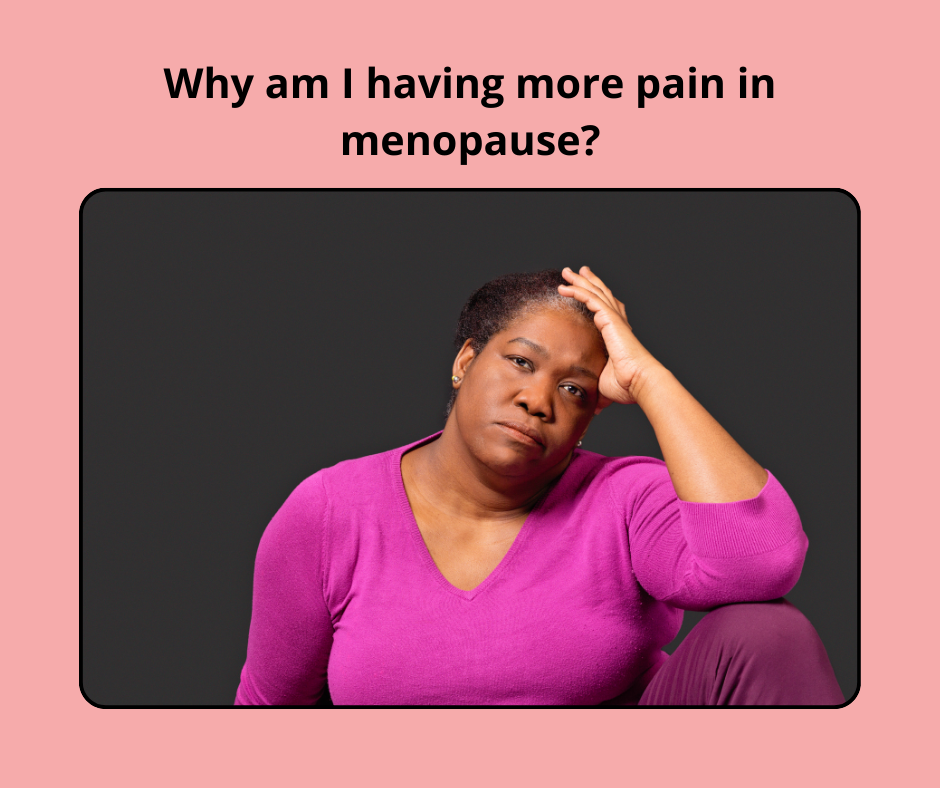Chronic Pain in Menopause & Beyond

Increased Pain in Menopause – Why? What can I do?
During menopause, many women have increased pain, different types of pain – but why?
Let’s look at a couple of key factors.
STRESS: When stress levels are increased, cortisol levels also rise. Cortisol influences serotonin and norepinephrine which may influence depression and pain perception.
ESTROGEN LEVELS: Decreased estrogen can increase pain, especially inflammatory pain. You may see an increase in osteoporotic and osteoarthritis symptoms.
SLEEP DISTURBANCES: Can exacerbate various pain conditions.
PSYCHOLOGICAL FACTORS: Mood swings, anxiety, or depression tend to increase during menopause and can contribute to the experience of chronic pain.
What can you do?
- Reduce stress through exercise, meditation, yoga and getting more sleep.
- Try adding phytoestrogens to your diet, like soy products or flaxseed.
- Increase your Vitamin D intake and get tested to verify your levels are 60 ng/dl or above.
There are many more holistic strategies that we teach and coach our students with. Sometimes, it takes some trial and error to find what works best for you.
The good news is: Pain can be controlled and reduced in almost everyone.
One type of pain that is the most prominent from declining Estrogen levels is osteoarthritis pain or joint pain. What are some ways to deal with this type of pain:
SUPPLEMENTS: Turmeric with Boswellia (also with bioperine and ginger to help absorption). This supplement helps with inflammation and pain. Omega 3 fatty acids from fish oil (or flaxseed oil) can be very beneficial as well. Knee pain seems to improve with Glucosamine/Chondroitin supplements as well to enhance healing.
PRACTITIONERS:
Chiropractic is the highly beneficial for joint problems. Many chiropractors can adjust any bone in the body which can be very helpful for problems in the hands, feet and knees for example. Finding a gentle chiropractor can greatly help reduce your pain and resulting disability (Activator Methods, Atlas Orthogonal and others are very gentle). Chiropractic will help the pain, but will also help to prevent further degradation of the affected joints.
Acupuncture: Acupuncture also enhances healing and reduces pain in joint problems. Acupuncture is thousands of years old and no one can argue that it works. Some acupuncturists have more experience in joint problems than others and many chiropractors are also licensed to perform acupuncture.
INCREASING ESTROGEN LEVELS NATURALLY:
While hormone replacement therapy (HRT) is a common approach to manage symptoms of menopause by supplementing estrogen levels, there are also lifestyle and dietary strategies that may help support hormonal balance. Before making significant changes, it's advisable for women to consult with a healthcare professional for personalized guidance. Here are some natural ways to potentially support estrogen levels during menopause:
- Healthy Diet:
- Phytoestrogens: Include foods rich in phytoestrogens, which are plant compounds that mimic the effects of estrogen. Examples include soy products, flaxseeds, legumes, and whole grains.
- Colorful Vegetables: Consume a variety of colorful vegetables and fruits, as they contain antioxidants and nutrients that support overall health.
- Engage in regular physical activity, as exercise can have positive effects on hormonal balance and overall well-being. Weight-bearing exercises can also support bone health.
- Achieving and maintaining a healthy weight can help regulate hormonal balance. Excess body fat can contribute to hormonal imbalances, including reduced estrogen levels.
- Prioritize good sleep hygiene to ensure sufficient and quality sleep. Sleep plays a crucial role in hormonal regulation, and disruptions may impact estrogen levels.
- Practice stress-reduction techniques such as meditation, deep breathing, yoga, or mindfulness. Chronic stress can affect hormonal balance, including estrogen levels.
- Limit alcohol consumption, as excessive alcohol intake may disrupt hormonal balance. Similarly, moderate caffeine intake is advisable.
- Include sources of omega-3 fatty acids in your diet, such as fatty fish (salmon, mackerel), flaxseeds, and walnuts. These may support overall health, including hormonal balance.
- Ensure adequate vitamin D intake, as it plays a role in hormone regulation. Sun exposure and dietary sources like fatty fish and fortified foods can contribute to vitamin D levels.
- Some women explore herbal supplements like black cohosh, red clover, or dong quai for menopausal symptom relief. However, the evidence on their effectiveness varies, and caution is advised. Consult with a healthcare professional before using herbal supplements.
For more information click here to watch the video